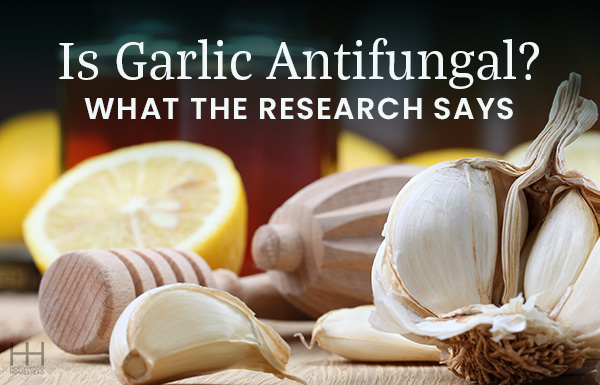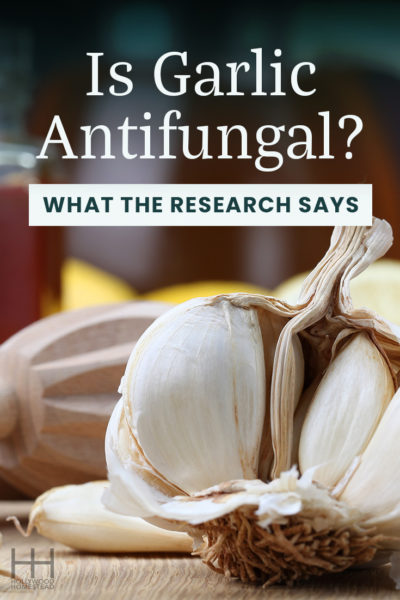
Garlic is prized for its aromatic flavor and for its power as a natural remedy. It’s even said to have antimicrobial, antiviral, and antifungal properties. But is garlic really antifungal? Let’s dig into what science has to say.
Is garlic itself a natural antifungal alternative?
First, it’s important to understand a lot of the studies on garlic are laboratory studies done in test tubes. These studies are an important step to learning about garlic and its compounds – but they don’t replace human trials. We often see that test tube results don’t exactly translate to the human body.
In the lab, garlic has strong antifungal properties, as shown in this study. In another invitro study, garlic was just as effective as a popular antifungal drug. (source)
But in human studies, garlic’s benefits have been more elusive. Sometimes they show up like a powerhouse… and other times not so much. The question is: why?
The Compounds Hold the Key
Over the last few decades, researchers have been working on isolating and testing different compounds in garlic to figure out which are responsible for antifungal properties.
Evidence points to allicin being one of the most important compounds in garlic. Allicin is a bioactive sulfur-based compound. It’s also highly unstable, which may explain why invitro studies show such powerful antifungal results – and human studies aren’t as consistent. (source)
Allicin is released when the garlic plant is damaged, like when a raw clove of garlic is crushed. Once cooked or processed, allicin quickly breaks down into other sulfur-based compounds that don’t have the same properties as allicin. That’s why you see raw garlic recommended by many natural health experts.
Should You Eat Raw Garlic for Antifungal Benefits?
Even though crushed raw garlic contains allicin, eating raw garlic may not get the results you want.
- First, you’d have to eat a lot of raw garlic to get enough allicin to make a difference – somewhere between several cloves and a few dozen!
- Secondly, research shows that when you eat garlic or take garlic supplements, no allicin can be detected in your blood. Again, this is due to the instability of allicin and how quickly it breaks down.
- Last, eating raw garlic just isn’t feasible for everyone. The amount you’d need to eat is too much for almost anyone’s stomach, but for people with digestive conditions like SIBO, eating garlic isn’t an option at all. Garlic is far too irritating to sensitive digestive systems and it would do more harm than good.
So how do we harness the power of garlic to get a true alternative antifungal remedy? The answer lies in a very specific type of garlic supplement.
Garlic Supplements vs. Stabilized Allicin
Garlic supplements themselves can be unpredictable. Many don’t have any allicin at all because processing destroys the compound. And some garlic pills can cause just as much stomach upset as eating garlic itself.
That brings us to one solution to the garlic conundrum: stabilized allicin. Stabilized allicin is created under controlled conditions that produce a bioavailable compound with high potency. With stabilized allicin, your body can actually absorb and use it effectively.
Even better, stabilized allicin supplements are non-irritating to the digestive system, so they’re safe for people with SIBO, IBS, or other digestive conditions.
I recommend using stabilized allicin as a natural antifungal alternative because it’s more potent, more consistent, and less potentially irritating for the digestive system than eating tons of raw garlic.
Want to learn more about stabilized allicin? I wrote a whole post on it here.
Have you used garlic as a natural remedy? What was your experience? Share in the comments below!

Latest posts by Sylvie McCracken (see all)
- Treating H. Pylori (Part 3): What H. Pylori Does to the Body - August 8, 2022
- Treating H. Pylori (Part 2): How H. Pylori is Contracted - August 3, 2022
- Understanding Beef Labels: Organic, Pastured, Grass-Fed & Grain-Finished - July 25, 2022
My husband is using generous amounts of allicin (as Allimed) to clear the remnants of old infection from his lung. The “streak” had been seen on several times on x-ray, and we thought this was a case of “better out than in.” Allimed had been wonderful to clear his SIBO, and he was on it long enough that his lung issue started softening so he could cough it up. This is a tedious process, but Allimed continues to help him make progress. He looks forward to a complete resolution and a clear x-ray.